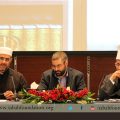In an event featuring the Grand Mufti of Egypt, the Chairman of the General Authority of Islamic Affairs & Endowments, the Grand Mufti of Dubai, and al-Habib Ali al-Jifri, Tabah Foundation released its latest analytic paper “Reducing the Role of Decision-Making Biases in Muslim Responsa”.

The new paper presents errors in the process of issuing fatwa and proposes solutions for reducing such errors and improving the accuracy of fatwas.
Tabah Foundation for Islamic Studies has released its newest research publication, titled Reducing the Role of Decision-Making Biases in Muslim Responsa. The brief sheds light on the errors that may occur in the process of issuing fatwas which may result from employing heuristics, It also proposes solutions for reducing such errors and improving the accuracy of fatwas. The new publication was issued in both Arabic and English.
The event organized by Tabah to mark the release of the brief was attended by high profile Islamic figures, among them the Grand Mufti of Egypt Sheikh Ali Gumaa,
H.E. Dr. Hamdan Musallam Al-Mazrouei, Chairman of the General Authority for Islamic Affairs and Endowments, Dr. Ahmed Abdul Aziz Al Haddad, Grand Mufti of Dubai and Managing Director of the Fatwa Department of Islamic Affairs and Charitable Activities, al-Habib Ali- al-Jifri, Chairman of Tabah Foundation, along with a number of muftis and academics. Sheikh Musa Furber, researcher at the Tabah Foundation, delivered a talk that shed light on a number of errors that petitioners commit when dealing with issues for which they need a fatwa. He also addressed the impact of such errors on the process on issuing fatwas when scholars deal with matters relating to the contemporary context or newly occurring issues. This study analyzes such mistakes.
During the event, the researcher presented the concept of fatwa and the significance of the role of the mufti in the process of issuing fatwas. He identified four stages in the process of issuing a fatwa: conception (the petitioner describes a specific case and the mufti asks for additional details); adoption (the mufti matches the relevant features of the case to the relevant legal subjects); evaluation (where the mufti checks whether the pre-conditions, essential elements and associated conditions for the issue that has been identified have been met in the petition’s specific case, and its ensuing legal consequences); and response (the mufti re-examines the petitioner’s circumstances to ensure that applying the ruling will realize the petitioner’s interests without violating the overall objectives of the Shari‘ah).
Then the researcher addressed a number of patterns that could be attributed to heuristic-related biases affecting the mufti, which he categorized into ten patterns: The anchoring effect (focusing on a past reference or a single trait or piece of information); the availability effect (estimating the likelihood of events based upon the ease with which they can be recalled from memory); the confirmation bias (seeking out or interpreting information in a way that confirms one’s preconceptions); fundamental attribution error (over-emphasizing the role of personality traits when explaining one’s own behavior); the halo effect (allowing the observation of a positive trait in one area or aspect of an individual to influence a positive evaluation of other traits); the reverse-halo effect (allowing the observation of a negative trait in one area or aspect of an individual to influence a negative evaluation of other traits); the overconfidence effect (excessive confidence in one’s own ability and accuracy when answering questions); the primacy and recency effects (the tendency that items near the end of a list are the easiest to recall); the recency bias (recalling or giving greater weight to recent over earlier events); and the self-serving bias (the tendency to claim more responsibility for successes than for failures). The researcher briefly explained the impact of these patterns in the conception and adoption stages of fatwa.
After the talk, the floor was opened for a Q & A session. Dr. Ali Gomaa initiated the session with a comment on the use of the term “bias”, speaking of its accuracy in describing reality, its appropriateness resulting from its use in modern literature and from its established use in ordinary speech. He noted that bias is present in almost all disciplines, like engineering, medicine, astronomy and other sciences.
A practitioner of any of these sciences cannot separate himself from the opinions he or she holds. He also added that a mufti must pay attention to the triangle of fatwa: conception, adoption and response. Muftis must ensure that their conception resembles the reality of the case. They must be precise when listening to the case, because there could be a “miss-adoption” if they hear what they want to hear. Finally, they must be precise in using the established ruling by ensuring that it applies to the reality on which the fatwa is based.
H.E. Dr. Hamdan Al-Mazrouei focused in his commentary on the importance of the comprehension and conception of reality held by muftis, and how it reflects on his legal rulings in terms of prohibiting or permitting things to the individual or society. Dr. Ahmad al-Haddad’s speech revolved around research and its foundation in relation to two essential concepts: the fiqh of the self and the fiqh of reality. He also emphasized the significance of God-fearing as the most important attribute of the mufti in issuing fatwa. He also stressed the importance of considering the legitimate legal dispensation for the petitioner.
Al-Habib Ali al-Jifri stressed that this study demonstrated the importance of this subject matter. The real problem lies in the wide gap between a fast-paced, ever changing and complex reality, on the one hand, and the legal rulings appropriate to their historical realities that scholars and jurists have mastered, on the other. This understanding underscores the importance of muftis who have a deep understanding of our current reality. This will enforce the credibility of those in leadership positions in fatwa and Islamic discourse.
It is worth noting that the brief, Reducing the Role of Decision-Making Biases in Muslim Responsa, recommends conducting an independent study that examines the impact of relying upon heuristics in Islamic disciplines. It also recommends that fatwa institutes educate their muftis about the influence of biases, and that the same instruction is included in mufti-training programs, since doing so will ensure that petitioners receive fatwas that are more accurate and more likely to improve the quality of their lives.

